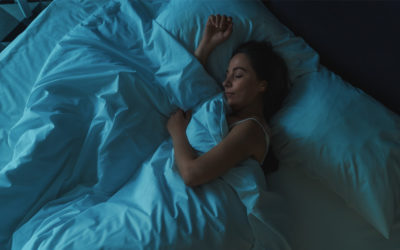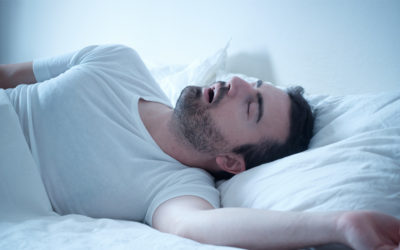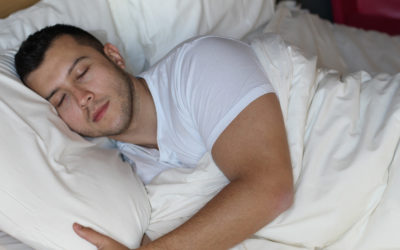Sleep Apnea
Getting enough sleep is essential for maintaining good health. Unfortunately for many people, getting a full night’s rest is a luxury – an estimated 22 million people in the U.S. suffer from sleep apnea, according to the American Sleep Apnea Association.
What is Sleep Apnea?
Characterized by repetitive pauses in breathing during sleep, sleep apnea occurs when the tissue at the back of the throat between the mouth and lungs briefly collapses and causes breathing to stop momentarily. With each apnea event, the brain and body become oxygen deprived and may wake the sleeper. This can happen hundreds of times a night and result in excessive daytime sleepiness.

Additionally, sleep apnea has been linked to diabetes, heart disease, obesity and depression, according to the Centers for Disease Control and Prevention.
Symptoms
Due to airway blockage, signs and symptoms of sleep apnea can include:
- Frequent loud or heavy snoring
- Gasping for air during sleep
- Abrupt awakenings accompanied by gasping or choking
- Dry mouth or sore throat upon awakening
- Excessive daytime sleepiness
- Difficulty with concentration or memory
- Mood changes, such as depression or irritability
- Nighttime sweating
Treatment & Prevention
Sleep apnea can lead to serious health consequences if left untreated. If you think you may have sleep apnea, make an appointment with your primary care doctor to discuss your symptoms. He/she can then refer you to a sleep specialist to determine if a sleep study is needed.
Treatment options depend on severity, but the most common treatments aim to keep your airways open and help you breathe normally, resulting in restful sleep. Options can include:
- Breathing devices. Continuous Positive Airway Pressure (CPAP) machine is a breathing device worn over the nose and/or mouth during sleep. The mask or other device is connected to a tube and delivers a continuous flow of air into the nose and/or mouth to keep your airway open during sleep.
- Mouthpieces. Custom-fit devices which keep the airway open while you sleep. When the mouthpiece is in, the jaw is held in a position to prevent it from blocking the upper airway. Your doctor may recommend this treatment option if you have mild sleep apnea.
- Surgical procedures. If you have enlarged tonsils, a small lower jaw with an overbite or a deviated nasal septum, surgery may be required to address sleep apnea. Possible surgical procedures include tonsillectomy, maxillary or jaw advancement and tracheostomy. Talk to your doctor about the different types of surgical procedures to determine what option is best for you.
Sleep apnea can be addressed through a range of healthy lifestyle changes. Follow these steps to help prevent sleep apnea:
- Maintain a healthy weight. One of the most common triggers of sleep apnea is being overweight or obese. To maintain a heathy weight, try to eat a balanced diet and work your way up to 150 minutes of exercise per week as recommended by the Office of Disease Prevention and Health Promotion.
- Quit smoking and avoid excessive alcohol consumption. Smoking can increase swelling in the upper airway, which worsens snoring and apnea. Because alcohol relaxes the throat muscles, it’s best to avoid consuming excessive amounts which can cause you to snore heavily or your airway to collapse.
- Avoid sleeping on your back. Gravitational force causes the jaw, tongue and soft palate to drop towards the throat and restricts breathing.
For More Information
Call 847-360-4124
Related Services and Conditions
Sleep Disorders Center
Are you sleeping well? Waking up rested? If not it could pose a more serious health threat than you think. Getting a good night’s sleep is vital to your overall health, safety and quality of life. Ongoing sleep deficiency is linked to increased risk of heart disease,...
Pediatric Sleep Disorders
Children can suffer from sleep disorders, too. An estimated 25-30 percent of infants and children experience sleep disturbances. Lack of quality sleep can have a negative effect on a child’s ability to concentrate in school, participate in activities or develop...
Sleep Study
During a study, patients stay overnight in one of our comfortable rooms. A technician will attach sensors to your head, chin, throat, chest, abdomen and legs to monitor your sleep during the night. These sensors detect brain waves, eye movements, breathing, heart...
Why Choose Us?
Vista Health System's two comprehensive Sleep Centers are nationally accredited by the American Academy of Sleep Medicine (AASM). That means, we've met or exceeded all of the highest standards for professional health care as designated by the AASM. These standards...




